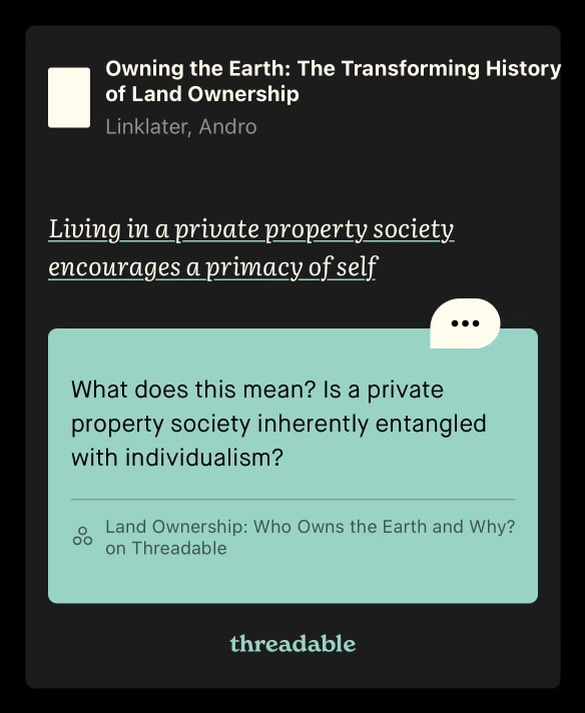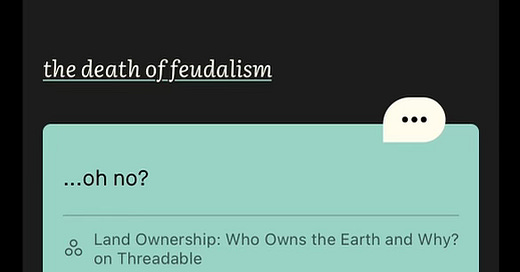Reading "Who Owns the Earth?" by Andro Linklater
Threadable-adjacent reading discussion on land ownership
This post is for anyone interested in reading about and/or discussing land ownership in parallel with the reading circle I’m leading on Threadable. If you can access Threadable and want to try it, I recommend diving into other circles, too—I’ve been enjoying reading Cadillac Desert with the Water Politics and the World circle; and the 1987 U.S. Supreme Court case Tanner v. United States with the hosts of 5-4, a podcast about “how much the Supreme Court sucks.”
Last week the social reading app Threadable launched several reading circles, including the one I’m leading, Land Ownership: Who Owns the Earth and Why? By request, I’m experimenting with facilitating discussions here on On the Commons for those who can’t (or don’t want to!) participate in the Threadable app, particularly since it’s currently only developed for iOS (Apple devices).
Threadable uploads the texts I’ve chosen, where people can then comment on passages and discuss the reading. Obviously, I can’t do that here—copyright issues among other things—but I can tell you what we’re reading, share the ideas and questions that have come up, and, thanks to reader Jake, who told me about archive.org (how have I never come across this before?!), can also recommend creating a free account there to borrow the book online and read the selection. If you want to. I’m not a teacher, there are no grades or other assessments, and there’s no requirement to read the chapter in order to participate in the discussion.
The first text for Land Ownership is Chapter 1 of Andro Linklater’s Owning the Earth, pages 9-23.
Linklater’s earlier books, such as Measuring America, have to do with land surveys. In Owning the Earth, he digs underneath those survey lines to look at where the idea of private land ownership started and how revolutionary, destructive, and creative it has been—though I’m not totally sold on the creative aspect. Many of the “creative” and beneficial consequences of private land ownership he points to seem to be fixes for earlier feudal systems that were in themselves unequal and unjust and just generally awful for most people (looking at you, Russian serfdom).
I chose Owning the Earth because Linklater’s overview of private land ownership is so far unequalled—where it’s taken hold, why, how it spread, and what the consequences have been. Later in the book he details many community-oriented land sharing systems that were, or still are in some cases, more commons-based, but in this first chapter he introduces us to the idea that private, individual land ownership, when it first came into being, was massively disruptive.
With that, here are some of the quotes highlighted and questions prompted in the reading—respond to as little or as much as you like, or talk about something else entirely:
(Emphasis added to the quote below.) Discuss:
“The way you own the earth requires the agreement of your neighbors, the society you live in, and the government of your country. In a very fundamental way, it is the glue that holds a community together. And every society agrees that it cannot in fact be owned.”
Chapter 1 starts in the 15th-century house Linklater lived in (he was Scottish) and his musing on the rumblings of private property and enclosure that led to the building of a chimney and private bedroom in the house. He writes of the original builder thinking about himself as an owner of land in a way that was completely new in societies across Europe.
My question is: What changes in our relationship to nature and other humans, the world, when we see ourselves as owners of nature and land rather than part of it, or in relationship with it, without owning.A key part of Linklater’s work throughout this book is showing how many different ways there are, and have been, of owning land throughout the world. None of them are set in stone. All of them are cultural.
Linklater describes a desire for privacy and comfort that inspired some new practices. Question: How far can a person take a desire for privacy and comfort—in the 15th century or now, for example for the introverts among us (including me)—before acting on it begins to have a detrimental effect on others?
Below is the highlighted quote from the book with the comment from a reader:

The focus of this chapter is to introduce the revolutionary aspect of private land ownership through the practice of land enclosure that really took off in the 1400s in England. Enclosure, by which people with means and pre-existing ownership claimed common land for their own, for profit, had violent and far-reaching effects (many of which, while Linklater details them, I feel he later glosses over in tone and a bit of a “but progress” reverence):
“In a single day in 1567, Sir Thomas Gray of Chillingham in the north of England cleared off his manor no fewer than 340, villains, cottagers, and laborers whose right to work their plots of land existed simply by tradition. Whole villages and townships were soon emptied—in Shakespeare’s county of Warwickshire alone, sixty-one villages were wiped out before the year 1500.”
There was a period when it was legal to enslave homeless people in England, such as under the Vagrancy Act of 1547, which came out of the forced removals that made enclosure possible:
“So many peasants were driven off the manors that once supported them, they were deemed a menace to England’s emergent property-owning society. New legislation condemned homeless people without means of support as ‘rogues and vagabonds’ who were liable to branding with a red-hot iron if found begging in the highway.”
How much modern chatter about homelessness is that different from a few hundred years ago? And how different, truly, are the causes? Below is a relevant quote from a reader from Thomas More’s Utopia, published in 1516:

The concept of “home” can be visceral. Who does not crave a sense of home? And what happens when others’ ownership makes “home” tenuous? (Emphasis added in quote below.)
“Yet that was the very point of the revolution, to allow one person to profit from the land, regardless of the consequences to the community.”
There are many lines in here that make me want entirely different essays, like this one: “Living in a private property society encourages a primacy of self,” on which I left this question:

Owning land does not exist in a vacuum. It is dependent on the surrounding commons and people who live on them, and it affects them in turn. (This is something discussed more in next week’s reading from law professor Erik T. Freyfogle’s The Land We Share.)
How do you get such a massive spectrum of land access that includes a Swedish- or Scottish-style extensive “right to roam” (which applies anywhere on private land and includes uses like camping and foraging) and “Trespassers will be shot” attitudes that pervade places like Montana?
How does ownership relate to a sense of security, or fear of scarcity?
Not within the reading or the comments, but something I’m perennially interested in because it played a pivotal role in enclosures of the commons, the Highland Clearances, and continues today in public lands grazing rights and battles in the American West: what is it about sheep?
I’d like this to be a discussion open for anyone who wants to participate, without my own narrative framework around it or paywall limitations. Feel free to share. I’ve got readings lined up for 12 weeks, including selections from a variety of books as well as original texts like the Charter of the Forest of 1217, the 1823 court case Johnson v. McIntosh that enshrined the Doctrine of Discovery in U.S. land ownership law, and the 15th-century papal bulls that make up that Doctrine.
This is a bit of an experiment, and I think of it as something we’re doing collectively, rather than something I’m leading. Do you want more time to read and think? More quotes? Fewer quotes? Just one prompt to get started? Let’s figure it out together.
I hope it’ll all be thought-provoking and that we can discuss these concepts with curiosity. Giving one another, as always, a little bit of grace.





Thank you again for doing this with the regular subscribers. I still have to read the rest of the chapter, but a couple quick pieces of feedback:
- Personally, I'm fine with you putting as many passages and prompts and screenshots in the posts here; I like the idea that we're more or less tracking what you're posting over at Threadable (though of course if that creates more work and it's not just simple cutting and pasting, please don't feel obliged!). I can always ignore what I don't have time for and some weeks I may not even chime in.
-What would be helpful, though, is to separate out more cleanly your own (non-question) running commentary and observations, and Threadable screenshots, from the specific prompts and questions we would be responding to. Right now it all seems mixed together randomly - bullet-point commentary interpersed with prompts that don't follow obviously from the previous bullet - so it's potentially a little disorienting. I think it might be easier if you just did all your own commentary first, and then had the shorter prompts+questions at the end for us to sift through. Just my own feeling but maybe others differ.
-As for timeline, I assume a week is the longest we should take to respond since you will be moving onto a new reading anyway, and we certainly don't want to create additional work for you keeping up with back posts on older readings. Unless you really don't care. I have no sense of what volume of people is following either here or on Threadable.
Hope this helps.
So, one initial response to your first prompt from the Linklater chapter:
[“The way you own the earth requires the agreement of your neighbors, the society you live in, and the government of your country. In a very fundamental way, it is the glue that holds a community together. **And every society agrees that it cannot in fact be owned.”**]
I found this particular passage a bit confusing and even counterintuitive when I first read, so I'm glad you included it. The chapter seems to be foreshadowing how land's unique status as a set of collective obligations, "the glue that holds a community together, will be eroded or perverted by the new ideology of private ownership. But then he throws this rhetorical curveball that in fact, owning the *earth* is not a coherent or recognized concept; only owning whatever relates to use of that earth. So he's making two simultaneous distinctions: an exclusive (individual) vs. shared (communal) form of ownership, and owning rights (legitimate) vs. owning land (not legitimate).
I didn't quite understand why he needed to suddenly emphasize this subtle difference, which qualifies or even walks back what was implied earlier, when it doesn't come up in the rest of the chapter anyway. Is his point simply that people began to treat individual property rights *as if* that equaled individual "earth" ownership, so the legal distinction would eventually collapse? Or, that it wasn't necessary to own the actual ground for the ideology to have its pernicious effects? Maybe I'm overanalyzing this, but it just felt discontinuous with the rest.